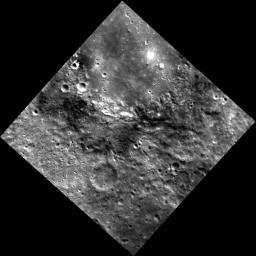This image, taken with the Narrow Angle Camera (NAC), shows part of an unnamed crater in Mercury's southern hemisphere. The relatively smooth crater floor is likely to be volcanic material that flooded the crater some time after it formed. The dark material visible in the crater's ejecta blanket was excavated on impact and is known as low reflectance material or LRM, one of the major color-compositional units that has been identified on Mercury's surface in MESSENGER multispectral images.
This image was acquired as part of MDIS's high-resolution stereo imaging campaign. Images from the stereo imaging campaign are used in combination with the surface morphology base map or the albedo base map to create high-resolution stereo views of Mercury's surface, with an average resolution of 200 meters/pixel. Viewing the surface under the same Sun illumination conditions but from two or more viewing angles enables information about the small-scale topography of Mercury's surface to be obtained.
Date acquired: December 16, 2012
Image Mission Elapsed Time (MET): 264155839
Image ID: 3151399
Instrument: Narrow Angle Camera (NAC) of the Mercury Dual Imaging System (MDIS)
Center Latitude: -35.41°
Center Longitude: 122.2° E
Resolution: 154 meters/pixel
Scale: From top to bottom, this image measures about 225 km (140 mi.)
Incidence Angle: 43.3°
Emission Angle: 11.9°
Phase Angle: 55.3°
The MESSENGER spacecraft is the first ever to orbit the planet Mercury, and the spacecraft's seven scientific instruments and radio science investigation are unraveling the history and evolution of the Solar System's innermost planet. Visit the Why Mercury? section of this website to learn more about the key science questions that the MESSENGER mission is addressing. During the one-year primary mission, MDIS acquired 88,746 images and extensive other data sets. MESSENGER is now in a year-long extended mission, during which plans call for the acquisition of more than 80,000 additional images to support MESSENGER's science goals.
For information regarding the use of images, see the MESSENGER image use policy.

 Planetary Data System
Planetary Data System












